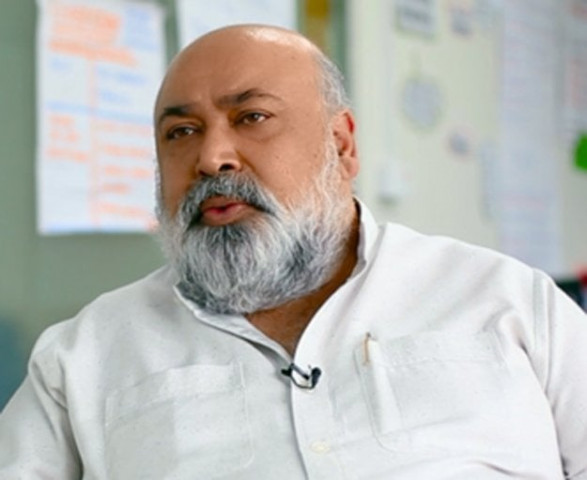'A tsunami is coming and we aren't doing anything to prevent it'
Oxfam country director says we will have no one else to blame if Pakistan become a water-deficient country

Women know how best to manage water, said Oxfam Country Director Mohammed Qazilbash. PHOTO: COURTESY OXFAM
This was stated by Oxfam Country Director Mohammed Qazilbash while he was speaking with The Express Tribune about the possibility of water scarcity hovering like a spectre over the country and the need for concerted efforts to conserve water.
Qazilbash has been serving as the country director of Oxfam since April, 2016. Oxfam is an international confederation of several non-governmental organisations (NGOs) working to eradicate poverty and bring improvement in human lives. In Pakistan, the organisation has been registered through Oxfam Great Britain and has signed a memorandum of understanding with the Pakistani government. It established its office in the country in 1973. However, the NGO's history of providing support to Pakistan dates back to the 1950s.
Many sister organisations of Oxfam Great Britain, including Oxfam Canada, Oxfam Hong Kong, Oxfam Australia, Oxfam United States and Oxfam Netherlands, have been supporting the NGO's work in Pakistan.
‘Country on threshold of water scarcity’
Water-related issues are one of the key areas of Oxfam's interventions globally, Qazilbash said. Currently, the organisation is working on a programme related to water management as it believes that without improvement, Pakistan will not be able to conserve enough water for its citizens, agriculture and industry in the future.
"Pakistan is a water scarce country. Whether you are living in urban centres or in rural communities, getting access to clean drinking water is a challenge," he said. Citing experts, he claimed that Pakistan will run out of water by 2025, adding that unless some action on a very large scale was taken, the country will be in a bad situation.
Offering solutions
Various NGOs, including the Statutory Participatory Organisation, Aware and Oxfam, have come up with a proposal to amend the Sindh Water Management Act, 2002, which regulates the use of water for irrigation.
Qazilbash pointed out that according to the Act, water governance bodies have been set up on different levels in Sindh. However, such bodies have no or very tokenistic representation of women. He asserted that women were more conscious of water-related issues as they were the ones who fetched water from other sources, used it for cooking and other domestic work, and also participated in agriculture along with men. "43% of the labourers in the agricultural sector in Pakistan are women," he said, adding that no water governance system could be effective and efficient without the active participation of women at every stage.
Oxfam report: ‘Revisit economic system to check inequalities’
"They [women] know how best to manage water and they know the actual value of water," Qazilbash said.
When asked whether the laws in other provinces enable women to actively participate in water management, he replied in the negative. The situation is more or less the same in all provinces, he said, adding that the NGOs proposed amendments in Sindh's law because Sindh, being the most progressive province, could lead other provinces in this regard. "There is a greater interest [in Sindh] in adopting new and more progressive policies," he said, mentioning that Sindh was the first province to increase the minimum age of girls for marriage from 16 years to 18 years. "We tried to convince the Punjab government to do the same but it did not work."
Besides this, the Oxfam country director also called for prudent use of water and review of agricultural policies.
"The dilemma is that we talk about water scarcity [but] are also net exporters of rice and sugar cane [which are water intensive crops]," Qazilbash said. "Not only do we grow these crops, but we also grow them in excess of our needs and then export them."
Ruckus in Sindh Assembly as MPA stages 'sit-in' over water shortage in constituency
According to him, new research helped develop water conservative irrigation techniques such as drip irrigation which also resulted in high yields. "These techniques are also being practised in many other countries in the world where there is water scarcity," he said.
Qazilbash stressed the need for taking steps to reduce water wastage in urban areas. He called for recycling water at homes and adopting water conserving technologies such as dry flushes in toilets.
He also urged each citizen to take part in water conservation. Millions of gallons of water could be saved if we turn off our taps while brushing our teeth. Teachers need to educate children about water conservation and every member of society should feel responsibility in this regard, he said.
"A tsunami is coming. We know it is coming and we are not doing anything about it as dramatically as what we should be doing," Qazilbash remarked. "You can't even last more than three days without water," he said, adding that water scarcity should be a major concern for the public. If we became a water-deficient country, it would be irreversible and we would have nobody else to blame but ourselves, he said.



















COMMENTS
Comments are moderated and generally will be posted if they are on-topic and not abusive.
For more information, please see our Comments FAQ